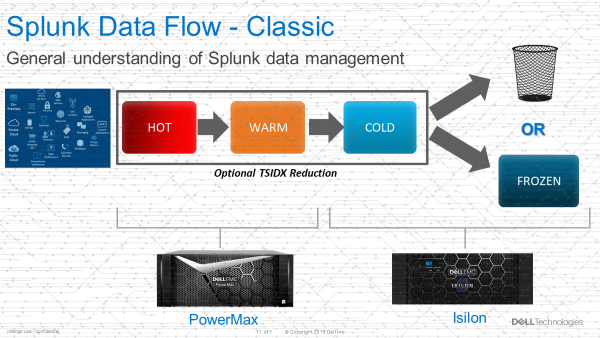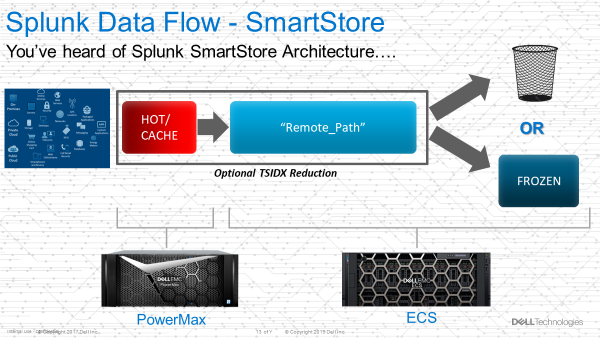I’m a Business Development lead with the Dell Technologies Unstructured Data Solutions (UDS) team. In this role I drive go-to-market and enablement for enterprise data center storage offerings with many of our partners in the Data Analytics and AI Solutions space. One of our key partners in this area is Splunk and I’ve been working with them for quite a while now. In fact, I recently attended .conf19 in Las Vegas with over 11,000 Splunkers and it opened my eyes. Let me tell you why I’m so excited about the possibilities for customers working together with Dell Technologies and Splunk on their journey to AI.
Splunk is already one of the largest data aggregators in the industry. I personally evaluated and deployed Splunk back in 2007 at a large media and entertainment company where we were using approximately 50,000 render cores with data coming in from numerous machine logs, applications, data bases, schedulers, render farms and many other sources. With this level of data consolidation there’s a need to apply machine learning for predictive learning and root cause analysis, a significant use case for Splunk.
Data growth continues unabated at an exponential rate due to the number of connected devices talking to the network. Everything today has sensors, with all of them transmitting data to some central repository for analysis along with other related data sets. With these and other IOT devices being so prevalent and decentralized we need globally distributed storage repositories to be able to receive this data.
Last year, Splunk announced availability of a new modern data path model called SmartStore. SmartStore allows you to decouple compute from storage and also supports the S3 protocol. You still have the hot/cache tier as tier 0 but now you can tier from it directly to a SmartStore target like Dell EMC’s Elastic Cloud Storage (ECS) which has been certified by Splunk. In addition, Dell EMC also released an ECS Splunk plugin freely available for customers who have deployed ECS and want to monitor it via Splunk. There are links below for information and downloads.
In the lead-up to Splunk .conf19 our friends from Big Data Beard set out on an epic roadtrip from Boston to Las Vegas driving an RV loaded with IOT sensors, collecting data and storing it on ECS via SmartStore. With the power of the combined offerings of Dell Technologies, Splunk and other sponsors, the Big Data Beard team captured data, spotted trends, predicted failures, and discovered more exciting ways to use Splunk to extract value from machine generated data. It was a great real time and real-world use case that generated a lot of excitement at the event.
Dell Technologies had three sessions at Splunk .conf19 that are archived at the links below.
- “Splunk Apps for Infrastructure from Dell EMC”. In this session, you’ll hear from an experienced Site Reliability Engineer how Dell EMC’s investment in Splunk apps across their platforms makes it easier for Splunk users to monitor infrastructure and integrate these insights into an overall application performance monitoring strategy.
- “Cloud-scale On-Prem: SmartStore Best Practices with Dell EMC”. In this session learn how Dell EMC delivers cloud-scale object storage for on-premises deployments of SmartStore and how you can leverage best practices learned from some of the world’s largest global Splunk deployments.
- “Secrets from a Splunk Ninja: Deployment Architecture Best Practices”. In this session learn more about the best practices that power some of the largest, on-premises deployments of Splunk around the world. Determine if SmartStore is right for your environment and size it for maximum performance and benefit.
Dell Technologies and Splunk offer a few ways to help customers tackle AI, ML, or DL challenges with prebuilt, pretested, preconfigured Ready Solutions or Reference Architectures, all with or without GPU’s.
As data growth continues the opportunities for Dell Technologies and Splunk customers expand. To learn more about our joint offerings check the links below.




